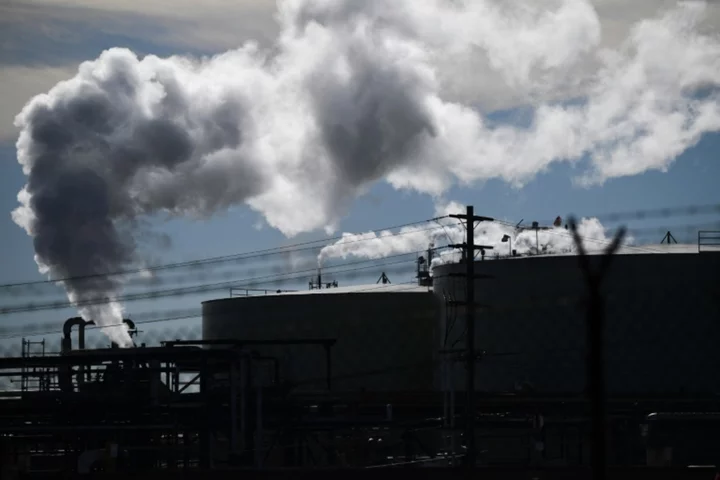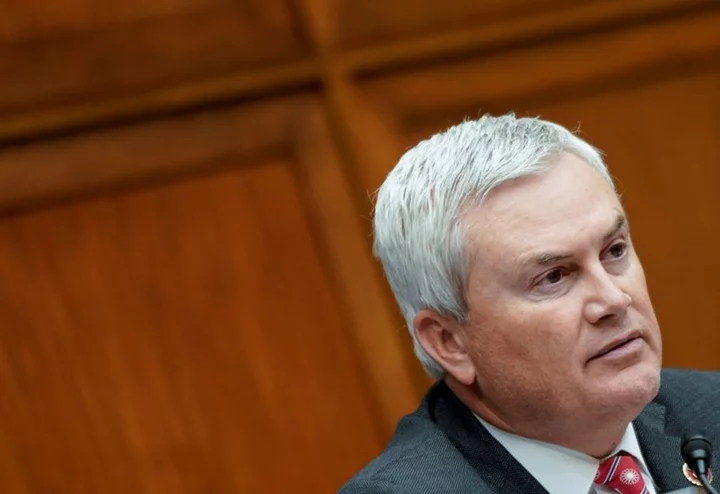Plans to expand oil, gas and coal production by major fossil fuel countries would push the world far beyond the Paris deal's 1.5C global warming limit, the UN warned Wednesday.
The future of fossil fuels will be a key flashpoint when world leaders meet at the COP28 climate conference later this month, tasked with salvaging the world's agreed temperature thresholds.
Most of the world's leading producers of fossil fuels have pledged to achieve "net-zero" emissions by midcentury -- a target that should align with the Paris Agreement's aims to limit global warming to well below two degrees Celsius (2.7 degrees Fahrenheit) since the pre-industrial era, and preferably a safer 1.5C.
But the annual United Nations Environment Programme (UNEP) Production Gap report makes it clear that the production plans of the top 20 producing countries -- including the United States, China, Russia, Australia and COP28 host United Arab Emirates -- are heading in the opposite direction.
Overall it found that governments' plans would produce 110 percent more fossil fuels in 2030 than would be consistent with limiting warming to 1.5C, and 69 percent more than would be consistent with 2C.
"Governments' plans to expand fossil fuel production are undermining the energy transition needed to achieve net-zero emissions, throwing humanity's future into question," said Inger Andersen, UNEP Executive Director.
"Starting at COP28, nations must unite behind a managed and equitable phase-out of coal, oil and gas -- to ease the turbulence ahead and benefit every person on this planet."
Burning fossil fuels is by far the main cause of climate change, accounting for most of the planet-heating carbon pollution driving global warming and the ensuing barrage of temperature records, devastating weather disasters and sea level rise.
But countries have been reluctant to officially acknowledge this in global climate negotiations, and even the Paris Agreement does not explicitly talk about how to reach the targets it sets.
That has led to a "large discrepancy" between governments' production plans and the need to rapidly move away from fossil fuels to meet global climate goals, said Ploy Achakulwisut, a lead author on the UNEP report and Stockholm Environment Institute scientist.
- Big emitters -
The UNEP report covers 20 countries that account for 82 percent of production and 73 percent of consumption of the world's fossil fuel supply.
It found that planned increases in production in these countries would produce 460 percent more coal, 82 percent more gas, and 29 percent more oil than would be in line with the 1.5C limit.
The report said the United States -- the top oil and gas producer globally -- has encouraged accelerated domestic production of oil and gas since Russia's invasion of Ukraine, even as it ramped up climate policies.
US authorities forecast oil production will reach and remain at "record high levels" from 2024 to 2050, with gas production continuously increasing, the report said.
Meanwhile, UNEP said the world's biggest emitter China produces just over half of the world's supply of coal, the most polluting of the fossil fuels.
Its domestic coal production reached a record in 2022 of around 4.5 billion tonnes, the report said, adding that production was expected to peak this decade.
China, the world leader in renewable power, is committed to peaking emissions by 2030 and becoming carbon-neutral by 2060.
- 'Hypocrisy' -
Two years ago at the COP26 meeting in Glasgow countries agreed to "phase-down unabated coal power", the first time a fossil fuel had been explicitly mentioned in the negotiated agreement. Abated generally means to capture emission before they go into the atmosphere.
UNEP hailed that pledge as a "significant milestone" but noted that since then production and use of fossil fuels have "reached record high levels".
Fossil fuels and the emissions they cause are expected to dominate at the meeting in oil-rich UAE from November 30 to December 12.
The incoming COP28 president Sultan Al Jaber, who also leads the state-owned oil firm ADNOC, has said phasing down all fossil fuels is "inevitable and essential".
But the UAE has no concrete policies to support a "managed wind-down" of its own fossil fuels, the UNEP report found, noting plans by ADNOC to boost oil production capacity by 2027 as part of a $150 billion investment plan.
The report "exposes the glaring hypocrisy at the heart of global climate action", said Harjeet Singh, head of global political strategy at Climate Action Network International, calling for wealthy polluters to lead by example.
Achakulwisut told AFP that many countries had used the conflict in Ukraine to double down on fossil fuels, but said a more durable solution for the climate and economy was the transition to clean energy.
"What our society needs is energy, it's not fossil fuels," she said.
lap-klm/rox









